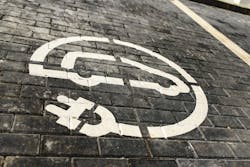Molders must act now to pivot to electric vehicles
By Karen Hanna
Auto parts makers still reeling from the effects of the United Auto Workers (UAW) strike that ended about a month ago don’t have much time to catch their breath. They need to find their niche in the electric vehicle (EV) transition now — or they’ll be left behind, warned Paul Eichenberg, the managing director of Paul Eichenberg Strategic Consulting, which works with companies in the automotive industry.
Describing the supply chain for internal-combustion-engine (ICE) vehicles as a “declining market,” Eichenberg said “very, very few” injection molders have taken a proactive approach to the transition. Most don’t have the size or scale to pivot to EVs.
Eichenberg projects many bankruptcies in the years ahead.
“You’re going have two types of bankruptcies: those who go into bankruptcy because of capital-intensive products that are eroding and going away, and they’re going to have to work to keep those supply chains open,” he said. “… On the opposite side is companies aggressively ramping up. As we need them to make aggressive investments, they’re not going to be able to keep up, there’s going to be bankruptcies on the growth side.”
The volume of thermoplastics in EVs is about 30 to 35 percent less than what’s used in ICE vehicles. According to a German study, the switch to EVs — which require fewer resources, less labor and less space to produce — will put at risk around 600,000 jobs in Germany alone, Eichenberg said.
To illustrate the risk that poses to manufacturers of components for traditional ICE vehicles, Eichenberg cited Tesla — its cars used to require about 10,000 feet of wire harnesses and connectors, but now need just 300 feet.
“You’re going to see a big fallout,” he said.
“The only people that can really afford to make these investments are the OEMs,” he said.
While sales margins are tight for ICE vehicles, automakers are making thousands on each EV they sell, giving them ample incentive to power ahead with the transition, even as the supply chain struggles to keep up, Eichenberg said.
At the same time, OEMs have warned about the effects of the strike on their business. By 2028, Ford has said its new contract with the UAW will add about $900 in costs per vehicle it sells.
“The new U.S. labor agreement with the UAW is expected to cost $8.8 billion over the life of the contract, with gross wages, accelerated wage progression and cost of living adjustments representing the largest three elements of that total,” Ford said in a recent statement.
Meanwhile, the UAW is seeking to parlay its contract triumphs with the Big Three to organize at non-union shops, with appeals on its website to “win economic justice at Toyota, Honda, Hyundai, Tesla, Nissan, BMW, Mercedes-Benz, Subaru, Volkswagen, Mazda, Rivian, Lucid, Volvo and beyond.”
Eichenberg warned automakers likely will expect their suppliers to absorb some of the additional costs of the UAW’s newest contracts.
He noted that, in its contract talks, the UAW was adamant in its resolve to secure jobs at battery plants — one area for possible growth as traditional parts jobs dry up.
Molders hoping to survive the transition can start there — by looking at ways they might be able to pitch plastics replacements of metal components essential to EVs.
In a project for a large resin maker, Eichenberg said his firm found many untapped opportunities for plastic — even in EVs.
“The opportunity we found was that many of the electric vehicle systems that are being developed today and, if we take the battery housing, the battery housing has been over-engineered. They’re being made out of steel, and they’re heavy, and weight’s a real issue with electric vehicles because you have all the lithium-ion batteries. But you have a real opportunity when it comes as to how these vehicles being rushed to market are being over-engineered,” he said.
The optimization of EVs is just getting started, he said.
That means for molders that are proactive and have enough scale to change their business, there still is opportunity to join the EV revolution.
“There’s lightweighting, there’s cost-optimization, there’s a lot of opportunities that are associated with that,” Eichenberg said.
Contact:
Paul Eichenberg Strategic Consulting, 248-670-9108, www.pauleichenberg.com

